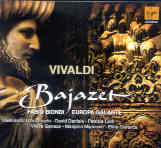This stunning work is one of the 50 operas composed on the subject of the bloody rivalry between the Tartar tyrant Tamerlano, whose methods of intimidation included constructing towers made up of his enemies heads (120 towers of 750 heads in Baghdad alone), and the proud Ottoman sultan, Bajazet, who after being imprisoned by Tamerlano opted for suicide rather than submission. In the opera, Tamerlano, though promised to the selfish princess Irene, loves Bajazet’s daughter Asteria, who tries to kill Tamerlano twice. Asteria loves and is loved by Andronico, a confederate of Tamerlano’s; Idaspe is a confidante of Andronico. Believe it or not, after Bajazet’s suicide, Tamerlano is satisfied, and he pardons Asteria and Andronico.
The opera is a pastiche: It contains music by Vivaldi, some original, some adapted from earlier operas (all the recitatives and arias for Bajazet and Asteria); arias by Hasse, Giocomelli, and Carlo Broschi (brother of the famous castrato, Farinelli) reworked by Vivaldi; and three (also by Vivaldi) that have been chosen by conductor Fabio Biondi where they were missing from the score. With the exception of the last three mentioned, though, it must be remembered that the work was entirely overseen by Vivaldi; it is assuredly “his”.
Conductor and cast throw themselves into this recording with a theatrical passion rarely encountered on CD: only René Jacobs’ recent Cosi and Figaro come to mind, and by nature those operas are more stageworthy. Recits are spat out in this vicious story, and the arias–many of the simile type (I’m a turtledove; I’m like a ship on a storm-tossed sea)–actually are put across as if they were relevant. Bajazet, here sung and acted to perfection by Ildebrando D’Arcangelo, touches the heart with his desperate, second-act “Dov’è la figlia”, in which he thinks his daughter has betrayed him by marrying Tamerlano; elsewhere, he sings with noble mien and fluent coloratura.
David Daniels may have too beautiful a voice for the role of Tamerlano, but his delivery is forceful, grand-mannered, and tough, and the singing itself is ravishing. Marijana Mijanovic sings the role of Asteria forcefully and with great dignity, her dark, lower register as stunning as her free middle and top. Vivica Genaux dazzles with her perfect coloratura as Irene in two arias composed for Farinelli; you wish the part were larger. Patrizia Ciofi’s Idaspe contains the opera’s highest-lying music; she handles it with ease, a pinched very high note aside. And Elina Garanca makes the most of Andronico’s music, delivering it with princely abandon.
Praise cannot be high enough for Fabio Biondi and his Europa Galante, who play with such verve and such smooth tone that all issues about “early music performance” are moot. The horns, although they don’t appear often (most arias are accompanied by strings in various formations), are played with great security and genuinely grand tone. The sonics are ideal, a slightly different acoustic for the recits aside. A bonus DVD featuring each of the singers performing an entire aria (and two for Bajazet) in rehearsal is great fun. What are you waiting for? [6/8/2005]
































